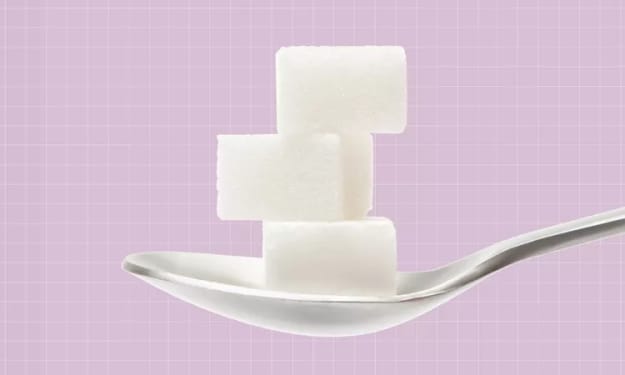Being Fit Doesn't Make You Healthy
What that means for you

Everybody wants it when they’re young. It’s edgy, it’s sexy, and it’s a status symbol. However, once you’re older, it’s nothing more than a fortunate coincidence.
Being Fit is like being Rich, but Health is Wealth.
Being fit does not make you healthy, just like being rich does not make you wealthy. It may look the same. Share similar attributes. In the same building but operate on different floors. Cross paths, but the costs have a different toll on you if you’re just rich or just fit. An occasional splurge might hurt your bottom line if you’re rich. Poor habits and eating garbage will eventually hurt you (or kill you). You can still be fit but you are not healthy.

Fitness vs. Health (Health Related Fitness)
We have different words for a reason. Health related fitness has 5 components: Cardiorespiratory fitness, Body Composition, Muscular Strength, Muscular Endurance, and Flexibility. That all sounds great. Measurable attributes to determine if the body is functioning well. Metrics related to the health of the being. However, that does not paint an accurate portrait of your health.
Health is the state of being free from illness or injury. Look how broad the health industry is today. Including other factors of health beyond the physical.
Fitness is just a fancy word for a parameter. A measure of performance that can be evaluated, compared, and contrasted.
Normative data tell us these specific parameters correlate to components of your health. Thus, we can say health related fitness is a parameter of your health. A parameter is not the complete picture of your health.

Imagine I send you a picture of $1 million in a briefcase and asked for your most prized possessions.
Wouldn’t you want to count the money in person? Or would you just appreciate that the case looks amazing? Yet, this is how most of us treat our health.
The Absence of Illness
The absence of illness or infirmity is crucial to the difference between health and fitness. You can function extraordinarily well physically, and still have terrible organ function.
Look at how many strongmen and bodybuilders are using CPAPs and struggling with metabolic diseases. Heart disease and high blood pressure run rampant.
Body composition is a component of health-related fitness. However, being lean doesn’t mean the poor habits won’t catch up to you. We aren’t even discussing your family history.
Your internal organ function can be compromised for reasons beyond your control. Increase the risk of diabetes, hypertension, and having a heart attack. All because the foods you are eating is killing you. The chemicals you put into your body, combined with the lack of sleep and extreme exertion, are recipes for disaster.
All this makes you unhealthy. Excess mental stress and fatigue make you unhealthy. Which is the reason you see bodybuilders dropping like flies. People who live lean and “eat healthy.” Everyone would acknowledge their “fit.” Sometimes, to compete professionally, athletes risk their long-term health.

Fit for Sports
To compete in their sport or activity, people can put their bodies in an unhealthy position. Being a lineman becomes very difficult when you’re an undersized athlete. The extra weight may not be natural to you, but it allows you to compete.
What’s their body comp, their blood pressure, their blood sugar, and their family history of diseases?
We don’t know. We don’t know their health.
People assume that because they aren’t lean, they must be unhealthy. Statistically, much of this country is overweight/obese. Ironically, most lineman would perform better on the health-related test than most people sitting at home watching them play sports and lamenting how out of shape they are.
How would your body hold up to high-level competition?
General Fitness is not the same as Sports Specific Fitness.
You know the difference. The difference between the first ride or the first run of the season versus your peak. It’s the difficulty transitioning from one sports season to the next. The struggle of the offseason and the preseason.
Every athlete remembers offseason and preseason conditioning. It was always the worst part of the season. Especially when you finally step on the field with all your equipment. The surplus of sweat, blood, and tears was a deterrent. Leaving most of us asking:
Why do we even have to condition?
Answer:
You’re not in shape for sport. Meaning you’re more likely to get tired, make a mistake, and get injured.
Playing sports after a long time off.
Even today, we can be in peak condition and still struggle to play a pickup game. Even worse, we struggle against our friends that don’t even workout.

It’s confusing. Because you are fit… right? You threw a ball around for maybe an hour at the most, but today… you can’t feel your arm.
Yes. You are fit. Generally fit... However
Remember your offseason conditioning? You were young and your body bounced back from everything. It was a struggle every year. Yet, you wonder why it’s hard to get back into hiking, biking, or skiing.
It’s a struggle because your body isn’t fit for the activity. After a few minutes, it all falls apart because we lack the sports specific fitness.
Sports Specific Fitness is required to compete at a high level consistently. Without it, the heavy toll it takes on our bodies can last a lifetime.
It’s not just you: General Fitness vs. Sports Specific
Even professional athletes have the same issues. The elite of the elite are often injured when they take part in an activity that is not related to their sport. You can think of several athletes that got injured playing a different sport recreationally. Which gave birth to clauses in contracts that limit what activity you can participate in. Like Cleveland asking Myles Garrett to stop playing basketball.
Our Bodies Are Not Created Equally

A track star or gymnast isn’t fit for bodybuilding, just like a bodybuilder isn’t fit to play most sports. The foundation is there, but their bodies must be adapted to the specific activity.
Take the fittest person you know. They wouldn’t be able to compete as an NFL lineman, a Sumo Wrestler, or a World Class Swimmer.
That requires sports specific fitness. Including the mobility and strength in a specific range of motion even before we get into the skill and technique. It’s hard to take an athlete, even within the same sport, and transition them seamlessly into a different position. Ask Pete Carroll and the Seahawks.
We see it when athletes return to sports after holding out of the preseason. Sure, they are working out hard, but without a full escalation to the specificity of true sport intensity, they end up getting injured.
This study from the journal of Arthroscopy, Sports Medicine, and Rehabilitation found that without the ordinary preseason workload, injuries in the abbreviated preseason spiked. 2019, injuries in the first 4 weeks were at 338, but in the 2020 season they jumped to 582.
It’s also of note of the injuries that occurred in the NFL over this 4-year span:
52% occurred during the preseason 38% occurred during the first 4 weeks. Meaning that 90% of injuries are occurring at the beginning of the sport where conditioning for the specific activity is an issue.
The Wrap-Up:
Today, we’ve discussed the misconceptions about fitness and health. Gone over the prominent bodybuilders who are fit but have been dying recently. The increased rate of injury after in the 2020-2021 NFL season after no preseason.

It’s broad, but so is fitness.
Being fit means you can perform physically within a certain range of parameters. These parameters can be associated with the external, physical components of health. Unfortunately, it doesn’t mean you are healthy.
Sports like World’s Strongest Man or CrossFit defining their terms. That’s great, but many of them aren’t transitioning into other sports with any success. Their fitness is as limited as an NFL player or NBA player trying to trade places mid-season.
You’re just like the Pros!
People, professional or otherwise, end up injured by diving into an activity at 100% with a body that is not prepared. Without the specific training needed to take part safely. Ending up injured like the pro athletes that miss the preseason.
It’s time to stop using these terms incorrectly.
For an educated professional, saying you’re “healthy” without a definition is just as annoying as saying “I eat healthy” without keeping track of your diet.

Professionals can be fit and unhealthy, just like professional athletes or weekend warriors. There’s nothing wrong with that.
The problem arises when we assume they are equipped to or are focused on the components of health. Professionals based on looks alone. With individuals that lack the scientific background. Unfamiliar with all the important parameters of health. Sure, we can want to have a body like theirs.
Most people don’t even understand the full costs of getting to that point. The toll it takes on the health of our mind and body. The long-term damage it has on the health of our organs and joints.
This is why you should consult a doctor or a movement specialist before engaging in a physical activity and/or exercise.
About the Creator
Blake A Swan
NCSA Strength and Conditioning Professional certified as a CSCS, TSAC-F, and CPT. I have my FMS Certification as well, and spent over a decade working with athletes in various sports. Including youth, high school, college, Olympic and Pro.






Comments (1)
Understanding that being fit doesn't necessarily equate to being healthy is crucial for informed decision-making about one's well-being. PillDoctor's https://www.pilldoctor.co.uk/ dedication to safety and quality care underscores the importance of seeking guidance from qualified healthcare professionals when navigating health and fitness choices. By consulting with independent prescribers and accessing reputable information, individuals can make informed decisions to prioritize holistic health and well-being beyond physical fitness alone.